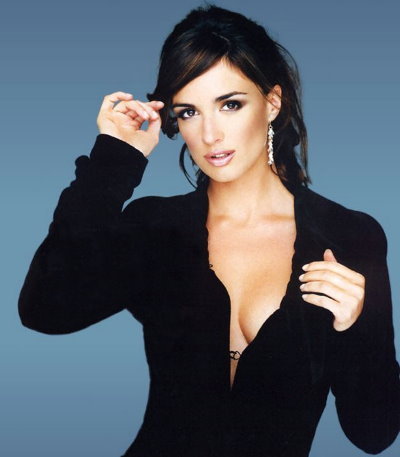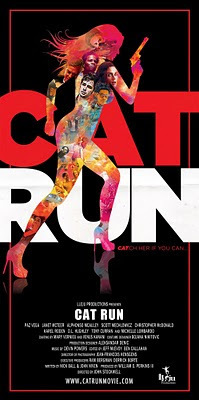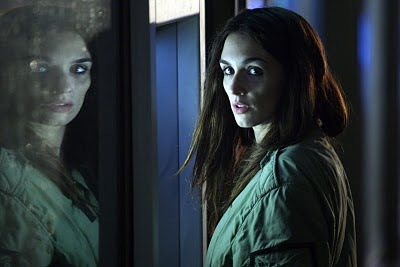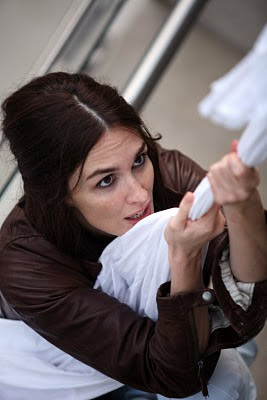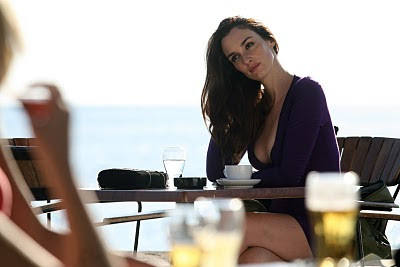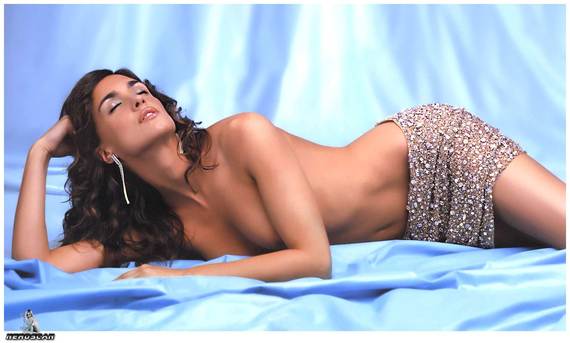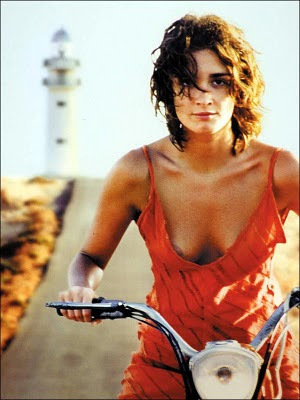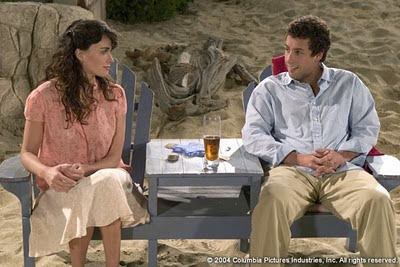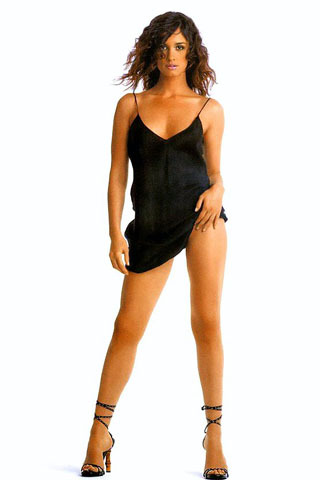I interviewed Spanish actress Paz Vega in 2011 regarding her then-latest film, "Cat Run." An international sex symbol since the steamy drama "Sex and Lucia," Ms. Vega didn't disappoint with her appearance, although like most actors, she's far more petite in person that she appears on-screen, or with her conversational skills, revealing a thoughtful intellect underneath the glamour.
PAZ VEGA: THE CAT'S MEOW
Spanish actress Paz Vega first gained international attention with her smart, sexy turn in Julio Medem's Sex and Lucia (2001), as a free-spirited young woman who finds personal liberation through a torrid affair after the loss of her boyfriend. The film's lush visuals (which included Vega's incandescent beauty) and sexual frankness raised eyebrows and heart rates in filmgoers everywhere. Vega soon found herself one of Europe's biggest stars, appearing in over 30 productions, including Almodovar's Talk to Her (2002), and making her American debut in James L. Brooks' serio-comedy Spanglish (2004).
Born in Seville January 2, 1976, Paz Vega was fascinated by the movies from a young age. Inheriting a theatrical flair from her father, a former bullfighter, she cut her teeth on Spanish television in the late 1990s before landing her first feature role in Zapping (1999). Married to Venezuelan businessman Orson Salazar, Paz Vega now makes her home in Madrid with her husband and three children and is an international icon of fashion, style and beauty.
Vega moves into action heroine territory with her latest cinematic effort, John Stockwell's Cat Run, a comedic thriller in which a young mother (Vega) finds herself pursued by a tenacious assassin (Janet McTeer, wonderful) after witnessing a massacre during a sex party in Montenegro. Aided on her journey by two awkward, but loveable, twenty-somethings (Scott Mechlowicz and Alphonso McAuley), this cat-and-mouse game deftly blends suspense, comedy and buckets of movie blood. Distributed by Paladin and LLjeu Productions, the film opens Friday, April 1.
Paz Vega sat down with us during a recent stop in Los Angeles. Here's what transpired:
This is a real change of pace for you: a pure action movie.
Paz Vega: When I read the script, I said 'Wow, this is a cool movie.' I'd never done this kind of movie before and after I spoke with (director) John Stockwell on the phone, I said 'Let's do it. Let's go to Montenegro.'
Had you been to that part of Eastern Europe before?
I'd been to Serbia, shooting another movie, but I'd never been to Montenegro. It was amazing people, great food, twist my arm. (laughs) It was awesome.
What spoke to you about this particular character? What part of yourself did you see in her?
Well, I'm a mother, first of all. Also, she's the one who carries the drama. She's trying to save herself and save her baby. But the movie's a comedy! So you try to find the perfect balance between the two, and she's really the character who holds all that together, so that really appealed to me. It was a challenge.
Did you like the comedy or the drama better?
The comedy. (laughs) I loved jumping into the comedy. It's true when they say...how do they say it in English?
"Dying is easy, but comedy is hard?"
Yes, that's it! Thank you. (laughs) Comedy is so hard, but it's what's hard that makes the work rewarding. Also, as a mother I know when someone wants to do something harmful to your kids, you can become a wolf, an animal. You'll do anything to save your baby, and you can do anything. So that's what was compelling for me. Not because she was a sexy girl on the run, but because she wanted to save her baby.
This is the most physical part you've ever done. Was that difficult?
It was physical, but I didn't need any extra training. I did do all my own stunts and own driving. We drove without permission sometimes. (laughs) But I enjoyed that. It was great fun.
Your director, John Stockwell, was originally an actor. Is it a different experience working with a director who understands acting from that perspective?
It was different, but in a good way. He knows exactly what you need. He knows exactly what he has to tell you to find what he wants. It was very easy. Sometimes you have a director who is shy, or doesn't know how to explain what they want. This is the second time I've worked with a director who was originally an actor. The other was Jada Pinkett Smith on Human Contact. It was the same. She knew exactly what she had to tell you. When I was young, I directed a play. I was a drama teacher for kids. I know that if I directed something now, I would know what to tell them.
Do you want to direct?
Maybe. We'll see. (laughs)
So you understand the process.
Yes.
Let's talk about your background. You were born and raised in Seville. Were any of your other family members in the arts?
My younger sister, my only sister, is an amazing singer. She has a beautiful voice and is preparing her next album right now. She's also a flamenco dancer.
Did both your parents work when you were growing up?
My mother stayed at home, and my father was a bullfighter.
Was he a famous bullfighter? I know in Spain, bullfighters are as famous as movie stars.
He was pretty well-known when he was young, he was a main bullfighter, a matador, the guy who faces the bull. But as he got older, he became one of the guys who works along with the matador. He was the guy who put the swords in the bull. But I understand if, as an American, you might not understand that or think it was okay.
I actually love going to bullfights, and didn't think I would originally, because I also love animals. But I've been to that beautiful ring in Seville where your father worked and seen a bullfight. It was amazing, and majestic. They really honor the bull in the ring, and the animal goes out with a lot more dignity than if he were just being raised for slaughter.
It is amazing and majestic. When the bull is killed, it's quick, and with no pain. You have to understand that the bull is raised just for that, and is treated like a king during its life. And all the meat is given away to the poor after the fight. What's better, to be raised in a cage where you never see the light and get to roam and be natural? Because that's the animal that we usually eat in a restaurant. You just have to be more open to understand. I know a lot of people might read this and take exception to what I'm saying, but we're not murderers or barbarians in Spain with our tradition of bullfighting.
I've never felt that way. Anytime I'm in Spain or Mexico, I try to find a bull ring and get myself a beer and a cigar and spend the afternoon. Hemingway had it right.
Yes, the bull has a good finale, especially because he winds up feeding people who need a good meal.
Back to growing up in Seville. When did you know you were an actress? Was there one inciting incident?
I was a competitive swimmer as a child, then one day I went to the theater to watch a play, and I had a revelation. I was sixteen. It was called La Casa de Bernarda Alba, by Federico Garcia Lorca. After that, it was so clear in my life what I wanted to do. But when I was young, I remember my father saying "Okay, let's go to bed" at eight. But I would keep the door open a crack, and watch the old black & white movies my parents would be watching on TV, and I would love that! Cary Grant, Lauren Bacall...Lauren Bacall is the last one now, isn't she?
Yeah, now that Elizabeth Taylor is gone.
So I was fond of old movies from the beginning. It was always there.
You started off acting in television.
Yes, and that was great training. You can watch yourself and keep changing an evolving your character every work. This movie, I did it a year and two months ago, and now I see it, and I cannot change anything. But with a TV show, you can keep changing and evolving your character, and that's great.
It's closer to the theater.
Yes, it is closer to the theater. And my second show on TV was with a live audience. We'd rehearse Monday through Wednesday, then on Thursday we'd shoot with a live audience for two hours, and the show was an hour long when it was cut together.
The first film I saw you in was Sex and Lucia, which made you an international star. Was it difficult being so young and performing such sexually-frank scenes?
Yes, well, I was twenty-four, but yes, I was young. I read the script and it was a scary experience for me, for several reasons. I cried when I finished it, because I thought, 'This is the most beautiful role I've ever seen before,' but you have to feel free to play a role like that. You have to just take the jump and say 'Okay, whatever you want, I'm free.' And I decided to do that. The director, Julio Medem, and I made this deal that I would be completely free and open, and I think it's a really beautiful movie. I'm very proud of it. It helped me a lot in my career. It gave me a lot of opportunities. If you want opportunities, you have to take that jump. (laughs)
Your first American movie was James L. Brooks' Spanglish. What was that like?
That movie was such a big studio movie, and it was so different from shooting movies in Spain. Cat Run was much similar to making movies in Spain, because it was an independent movie and was shot relatively fast. With Spanglish, we must have shot for around eight months with a lot of big sets and big trucks, and I was thinking to myself 'Wow, this is really Hollywood!' (laughs) It was quite overwhelming, but I had a great time on it.
When I've interviewed actors and filmmakers from Europe in the past who've come to the States to make films, they all say the same thing: in Europe filmmaking is very much a community, and in the States it's very much a business.
Yes, exactly. It is. But this is now a problem in Europe now, as well. In Spain, no one wants to see Spanish movies anymore. We like to think of ourselves as artists in Spain, when we make movies, but the audiences aren't responding to the films from their own country anymore like they used to They want to see the big American movies, like Spiderman. I understand that this is a business and you have to make money, so I understand the Hollywood mentality that films have to be commercial, but it's also nice to have some variety.
Is this a recent development in Spain where people are more drawn to Hollywood movies, or has it always been that way?
I think it's pretty recent. I'd say for the past five years, or so. They want to see the big Hollywood films, and for Spanish filmmakers, the box office is not going so well.
Even for people like Pedro Almodovar?
